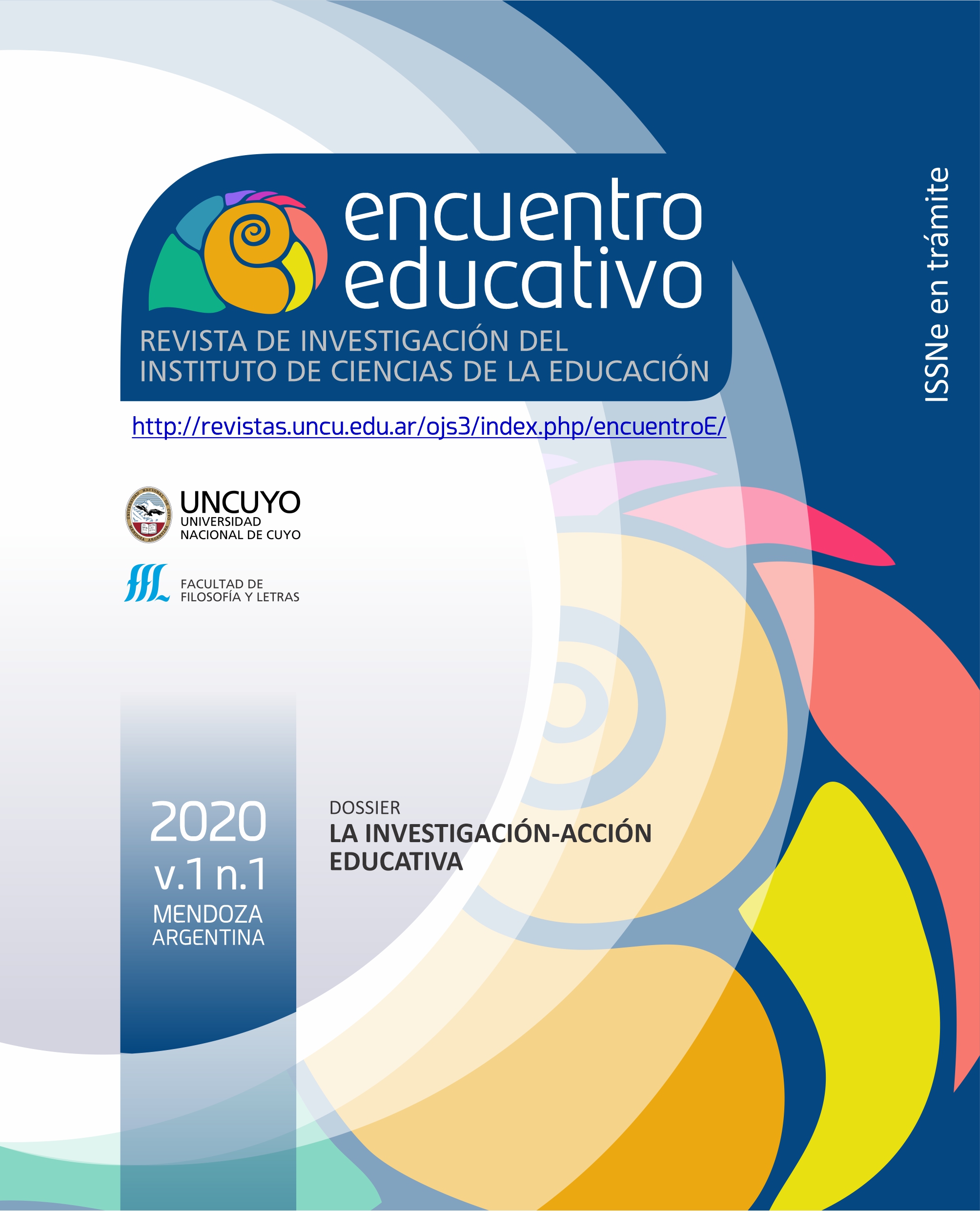The identity of the teaching activity: building a participatory action research experience
Keywords:
Participatory Action Research, Teaching Identity, Teaching practice, Reflection and Action, Teacher EducationAbstract
This is a review of a pedagogical experience in the framework of the university chair Identity and Teaching Profession developed under the modality of Participatory Action Research (PAR), with fourth-year students from the educational bachelor in Biology, Physics and Mathematics, from the Faculty of Exact, Chemical and Natural Sciences of the National University of Misiones (FCEQyN).
The experience was organised with moments of problematization, analysis, reflection, reading and systematization of situations and experiences about the
identity of the teaching activity. We worked the contents of the discipline through paths that promoted reflection on the processes of construction of professional identity, a way of self-socio-analysis (Bourdieu, 1999) that allowed students and
teachers to assume themselves as products and producers of their own social trajectories: family, school, etc. We show some aspects of the process followed by the participants in their journey and in the constitution of their teaching identity.
The PAR represented an opportunity of self-improvement available to all participants, it facilitated a critical revision of their own practices and the conceptions that support them. It allowed the dialectical articulation between theory and practice causing the breakdown of the "common sense" of the
teaching practice. In this experience, firstly we invited students to talk about their ideas regarding the teacher identity and shared their life stories; we teachers related our teaching experiences to the eighties and nineties. We invited other
teachers with diverse trajectories so they could share their testimonies too. Students elaborated narratives about all these (lived situations) experiences.
As a self-reflective group we got to know different conceptions of teaching and practice, as well as the process of constructing the identity of the teaching activity, using writing autobiographies as a strategy.
We work methodologically as Carr and Kemmis (1988) proposed, as a selfreflective dialectical spiral, constituted by successive cycles of planning, action, observation, reflection and action.
References
Achilli, E. L. (2005). Investigar en antropología social. Los desafíos de transmitir un oficio. Rosario, Argentina: Laborde.
Achilli, E. L. (2001). Investigación y formación docente. Rosario, Argentina: Laborde.
Alliaud, A. y Antelo, E. (2009). Los gajes del oficio. Enseñanza, pedagogía y formación. Buenos Aires, Argentina: Aique Educación.
Alliaud, A. (2017). Los artesanos de la enseñanza. Acerca de la formación de maestros con oficio. Ciudad Autónoma de Buenos Aires, Argentina: Paidós.
Bourdieu P. (2007). El sentido práctico. Buenos Aires, Argentina: Siglo XXI.
Bourdieu, P. (1999). Intelectuales, política y poder. Buenos Aires, Argentina: Eudeba.
Carr, W. y Kemmis, S. (1988). Teoría crítica de la Enseñanza. Barcelona, España: Martínez Roca.
Da Silva, T.T. (2007). A produção social da identidade e da diferença. En T.T. Da Silva (Org), Identidade e diferença: a perspectiva dos estudos culturais (pp 73-102). Río de Janeiro, Brasil: Vozes.
Davini, M. C. (1997). La formación docente en cuestión: Política y pedagogía. Buenos Aires, Argentina: Paidós.
Edelstein, G. y Coria A. (1995). Imágenes e imaginación. Iniciación a la docencia. Buenos Aires, Argentina: Kapelusz.
Ferry, G. (1997). Pedagogía de la Formación. Serie Formación de Formadores. Documento Número 6. Argentina: Novedades Educativas.
Hall, S. (2006). A identidade cultural na pós-modernidade. Río de Janeiro, Brasil: DP&A.
Hall, S. (2007). Quem precisa de identidade? En T.T. Da Silva (Org), Identidade e diferença: a perspectiva dos estudos culturais (7ª ed., pp 103-133). Río de Janeiro, Brasil: Vozes.
Kemmis, S. (1999). La investigación-acción y la política de reflexión. En J. F. Angulo Rasco, J. Barquín Ruiz y A. Pérez Gómez. Desarrollo profesional del docente: Política, investigación y práctica. Madrid, España: Akal.
Remedi, E., Landesmann, M., Edwards V., Aristi P., y Castañeda A. (1988). La Identidad de una Actividad: Ser Maestro. Temas Universitarios, Universidad Autónoma Metropolitana. Unidad Xochimilco, MX.
Rockwell, E. (1995). La escuela cotidiana. México DF, México: Fondo de Cultura Económica.
Schon, D. (1992). La formación de profesionales reflexivos. Hacia un nuevo diseño de la enseñanza y el aprendizaje en las profesiones. Madrid, España: Paidós.
Sirvent, M. T. y Rigal, L. (2012). Páramos andinos. Investigación acción participativa. Ecuador: Proyecto Páramos Andino.
Stenhouse, L. (1993). La investigación como base de la enseñanza. Madrid, España: Morata.
Vera, R. (1988). Orientaciones básicas de los Talleres de Educadores, Cuadernos de Formación Docente, 7. Universidad Nacional de Rosario, Argentina.
Wenger, E. (2015). Comunidades de práctica. Aprendizaje, significado e identidad. Barcelona, España: Paidós.













